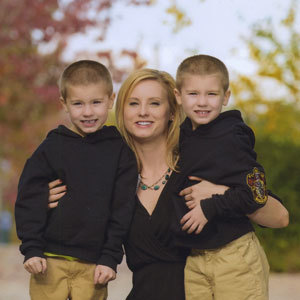Certificate Program Grad Leads Youth Ministry Initiative
November 6, 2019 | Alumni, Continuing Education, Fellowships & Grants, Initiatives, Public, Spiritual Life, Youth Ministry

Growing up, Sarah Beck went to church every week. That was the rule. Until she turned 18, she had to be at church on Sundays. “My feeling by the time I had left church,” Beck remembers, “was I had served my time and I was never going to go back.”
After nearly two decades away, Beck is in the last place she ever expected – back at Tualatin Presbyterian, the church her family attended when she was in middle school. She’s not just attending – she’s director of family ministries. In 2018, she received a Certificate in Youth and Theology from Princeton Theological Seminary, and in August that same year the Seminary named Beck’s church one of 12 selected to receive a $15,000 grant and participate in The Log College Project, an initiative centered around creating, testing, and implementing new models of youth ministry.
Beck, who earned a master’s degree in conflict resolution from Portland State University, knows why she left church at age 18. Now, she’s using her leadership role to help children and young adults get to know the joy of a vibrant and deeply caring God that it took her 20 years to discover.
She had first ventured back through the doors of a church after her twin sons were diagnosed with special needs. Her marriage deteriorating, Beck remembers feeling isolated, overwhelmed, and full of grief. At a nearby Episcopal church, she began to experience community of people who supported her as she adjusted to life as a single mother with her twins’ new medical reality.
“Our programs fit the kids. The kids don’t fit the program.”
She wanted to invest in the lives of children and young families, helping them experience God’s joy and care as she was now experiencing it.

But there weren’t many young families at her current church. So, Beck returned to Tualatin Presbyterian, a 350-person congregation about 20 miles south of Portland, Oregon. Under the leadership of Pastor Ken Evers-Hood, MDiv ’00, the church was not focused on strict rules or doing things how they’d always been done.
“We can try anything once at Tualatin,” says Evers-Hood, who earned his Master of Divinity at Princeton Theological Seminary and his PhD from Duke Divinity School. “We might not try it twice, but there’s room to experiment.”
In testing new approaches to ministry, Evers-Hood has found that failure can often be instructive. He’s learned to embrace innovation and uncertainty. “It’s a very supportive environment,” Beck says. “We are creative and innovative. Our programs fit the kids. The kids don’t fit the program.”
Log College Project team in Tualatin is an intentionally intergenerational group with three students and adults from both their parents’ and grandparents’ generations. For the next three years, they’ll work together to design and launch a new youth ministry specific to their church community. The team will use a digital curriculum created to help them dig deeper into theology, design, and biblical foundations for ministry innovation. The Tualatin team met with other teams and innovative business leaders during the “Design Lab” this summer on campus at Princeton Seminary.

In addition to Beck, the design team members include Pastor Evers-Hood, family ministries elder Jeff Engh, parent and church member Patrick Ramos, and youth members Ella Evers-Hood, Anya Ramos, and Ryleigh Christopherson-Engh.
“We are co-launching a Dreamer-sicle ministry,” says Beck. “Kids from our church and community partners will gather in our shared space and make paletas, a Salvadorian dessert that is half ice-cream and half popsicle. On the stick will be written the words ‘Working together; Dreaming Together.’ Our slogan is “Dreamer-sicles frozen ice-cream desserts make I.C.E. something sweet.”
The ministry challenge, Beck says, is that “young people want to build a youth-led partnership that models mutual support and solidarity for immigration rights.”
Beck says she wants students to experience Christianity in a way that encourages resilience and empowerment. When this happens, she says, church “takes on a much different feel” for youth and teenagers. “It has a place in other parts of their world.”





